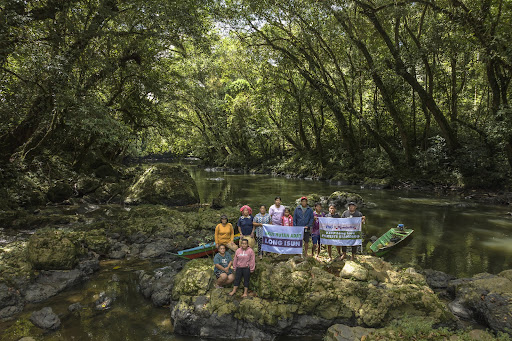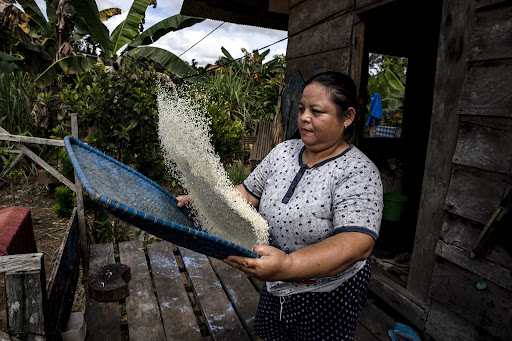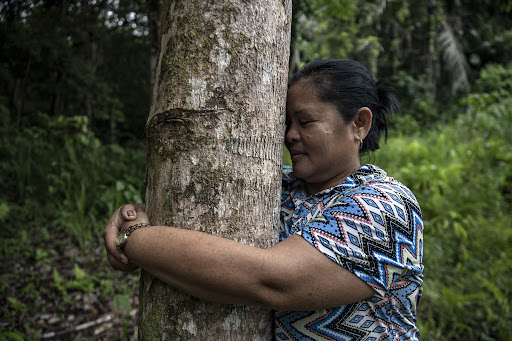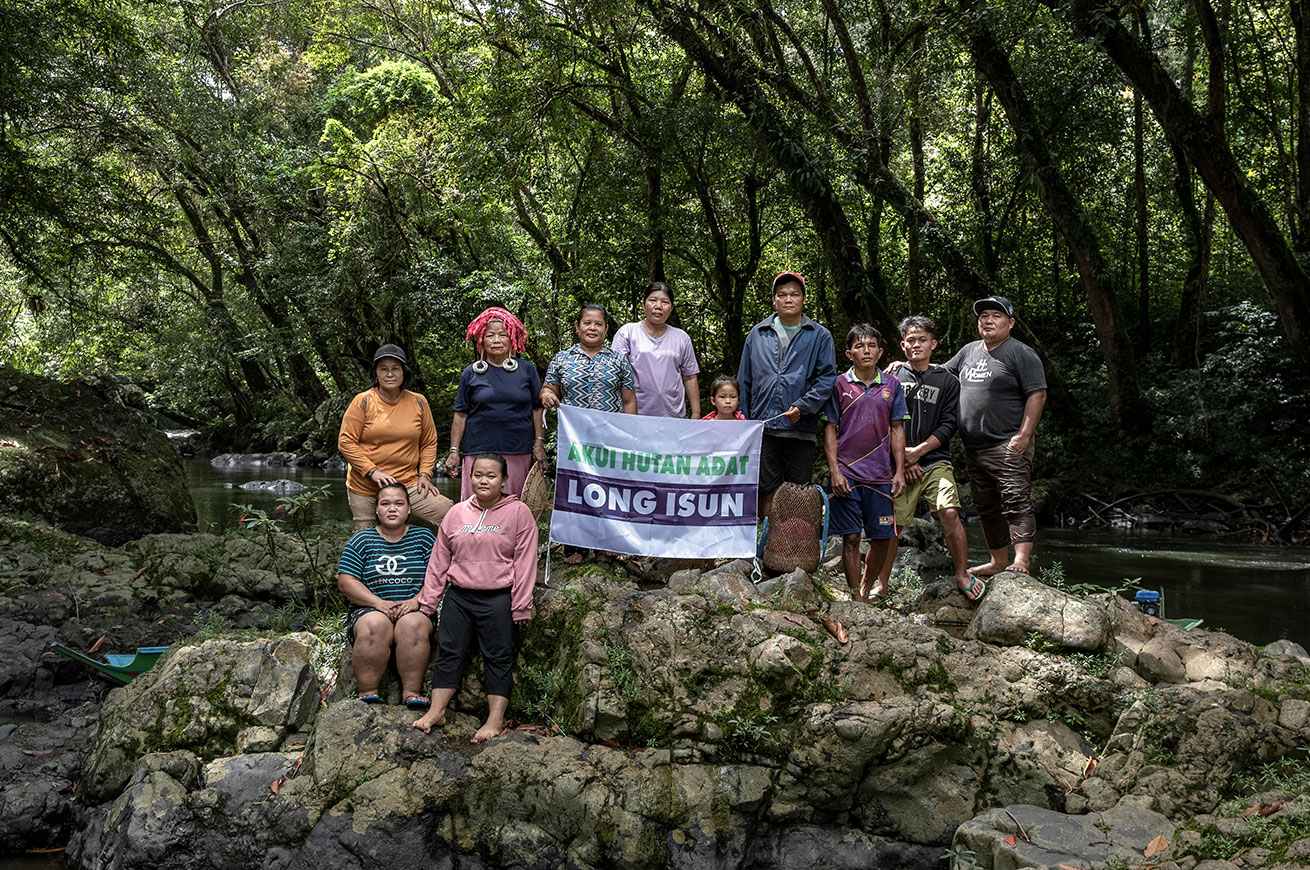With the climate crisis in full swing, protecting ecosystems that stabilize the climate like tropical forests is more urgent than ever. Forests naturally store massive amounts of carbon in the soil and absorb greenhouse gasses, helping to prevent global warming. According to scientists, intact forests can reduce emissions by more than 30 percent by 2050 to keep global warming below the widely agreed 2°C temperature rise needed to avoid catastrophic climate change.

What’s maybe less known is that the fate of intact forests is inextricably linked to Indigenous Peoples and local communities. Despite only stewarding 22 percent of the world’s land, Indigenous territories protect 80 percent of the planet’s biodiversity. These lands are also estimated to contain 36 percent of the world’s remaining intact forests. These facts shouldn’t be surprising as Indigenous Peoples have lived in harmony with the natural world for centuries — the rest of us are only beginning to understand the importance of Indigenous land stewardship now.
This deep rooted connection between people and the Earth is captured in the relationship that the Dayak Bahau of Long Isun –– one of the communities that RAN partners with in Indonesia –– have with their land in the Upper Mahakam region of Indonesian Borneo.
The Long Isun community depend on their land and forests for everything — from the vegetables they grow in their forest gardens, to the fish and game they hunt for food; from the variety of plants they use for medicine, to the wood and rattans they use for building materials and handicrafts. The forest is their source of life and the place where they believe their ancestors and the deities that protect them rest.
Their Indigenous territory covers over 80,000 hectares of rich forests — larger than all five boroughs of New York City combined. They manage this area through eleven customary categories of forest functions and land use, including areas for settlement, forest production, hunting grounds, medicine, conservation, and grave sites.
Tana Perladangan, for example, is the area where the community grows food crops such as rice paddies, cacao, durian, duku, and other fruits and vegetables for their own consumption. As is common with other Dayak communities native to Borneo, the Dayak Bahau rotate their crop farms and leave them to reforest, sometimes up to 10 years, using and restoring the forest ecosystem sustainably. They also have a forest reserve area, called Tana Peraaq, which is protected to sustain future generations.
These land use designations are assigned through community decision-making processes led by Indigenous leaders or Hipui, especially when opening new forest areas, often held in their customary hall or Lamin.
The Long Isun community’s connection to their land is also deeply spiritual, shown in their continued practice of customary rituals that have been passed down for generations, to pay respect to their deities and ancestors.

Rice paddies, for example, produce a staple food in the community. Rice is also believed to originate from the body of one of their deities as a great sacrifice to provide food for humans on earth. Because of this belief, there are many customary regulations and rituals around the farming, planting, and harvesting of rice paddies, including an annual dance ritual that call on the Hudoq deity to come down to earth to protect their paddies and bring a bountiful harvest season.
A rare and sought-after ironwood tree called Ulin is native to Borneo and is found on Long Isun’s land. The tree is also believed to have once been the child of an old ancestral couple, and current customary practice demands that the tree’s spirit needs to be respected. If a community needs to cut down even a single Ulin tree, to build a house for example, a ritual needs to be performed as the original ancestral parents requested.
The Long Isun community believe that their ancestors’ spirits flow through the food they consume and the land, rivers, and forests they depend on. This inseparable connection between the human, natural, and spiritual worlds guides their way of life and is one of the reasons they are the best-placed to continue to be guardians of their forests.

Unfortunately, their forests are now under threat from logging companies controlled by an influential Indonesian conglomerate, the Harita Group, that was granted concessions to log Long Isun’s forests without the community’s consent. The Long Isun community has protected the forests from logging and palm oil development for over a decade. The Harita Group has temporarily stopped their logging operation but they have not given up their concessions and the threat of future development remains.
This fight has now led the community to petition the Indonesian government to legally recognize their Indigenous territory. Legal recognition is the first step towards securing their customary forest title (Hutan Adat), which grants them ownership and management rights over their lands. Studies have found that forests managed by Indigenous and local communities who have secure rights to their land have lower rates of deforestation and greater biodiversity, while improving community livelihoods and reducing greenhouse gas emissions.
Long Isun’s fight over their forests and land rights is a local one, but powerful global companies are connected to it. Major global brands like Mondelēz and Procter & Gamble also source palm oil from the Harita Group even as its timber division threatens the Long Isun community.
With their significant leverage, these multinational brands have the opportunity to contribute to the protection of intact rainforests and ensure their supplier respects the rights of Indigenous communities across their entire operations, but they need to act and act now.
Join Long Isun’s fight by demanding major brands use their influence to ensure the rights of the community are respected!
References
Widjono, Roedy H., et al. Dongeng Dayak Bahau: Sastra Lisan Warisan Leluhur. Nomaden Institute Cross Cultural Studies, Perkumpulan Nurani Perempuan, Penerbit Kota Tua. 2019.
Hanyang, Ignasius, et al. Mengenal Long Isun Lewat Warisan Leluhur Dayak Bahau Umaq Suling: Catatan Perkumpulan Nurani Perempuan. Perkumpulan Nurani Perempuan. 2021.
Rainforest Action Network discussion and interviews with Long Isun community members in March and July 2022, and January 2023.
